If you've ever struggled for several weeks over an essay of 10,000 words, you could ask yourself - how do real writers do this? Sure they had luck. But they also work hard. Stephen King, John Grisham. Have you read them all? Just reading their list of titles borders on exhausting. However, these people have worked to the exclusion of a lot of what most of us would call 'the rest of our life' (and which the grumpy creative might call 'those fucking distractions').
I confess, if I had the time and money to write the way I'd want to, I'd be writing between like 6pm to 4am every day. I'd be in good company; those are the hours when Ridley Scott writes his blockbusters (no interruptions, no phone calls...).
Which brings me to my only top anything this year.
Martin Harris' art, and his tragic and utterly unnecessary death.
You know how, when some bozo nicks a car, trashes it and causes other people to be crippled or dead and their mates and mum burble up and tell us how wonderful they were, how generous and kind, and you know it's a pile of crap (aside from anything else, how many of us know people like that?). Well, Martin really was like that.
Art enthusiast and curator the Art Whore website, Josh Griffiths:
When I interviewed him in 2017, I asked to buy some art he did for the interview ... Martin insisted I have it for free - and posted it out with a loving note ... One day, when he saw how much I liked the Russian character Cheburashka, he surprised me by posting me out a Cheburashka toy as a gift.
Needless to say, Josh has never met Martin. Yet they had a special connection. Martin had a gift like that.
A few years ago, I wrote of Martin:
In a world of profit and consumables, as prevalent in the art world as in that of the tinned food world, Martin Harris captures the strange duality of the child, filled with amazement at a wider, exciting world and, at the same time, permeated with an undercurrent of dread. That dread is mysterious to the child, but we as adults recognise it as well as Blake did: the borderline no-man’s-land where Innocence and Experience whirl, distinctly separate, then overlapping. Martin’s affinity with such relics of childhood is so deeply felt, profoundly human and wide-eyed with wonder that the ‘relics’ are not things he has long discarded, but intimate aspects of his own present-day self.
If you must have a clearer music link, if rock and roll songs aren't also “relics of childhood”, then you, dear reader, are a genuine alien.
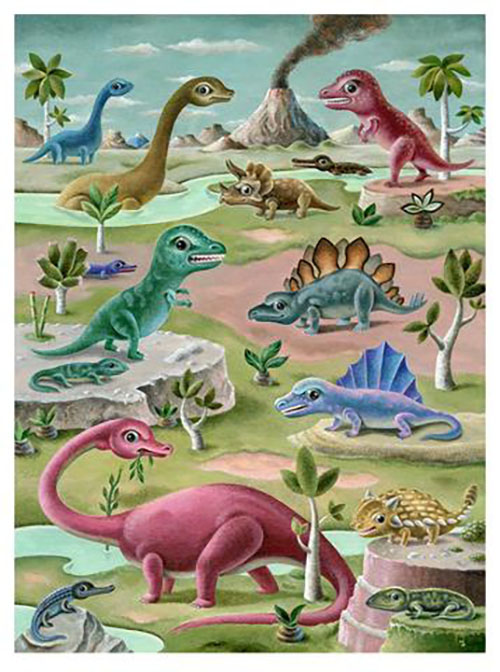
Martin Harris kept Ridley Scott blockbuster hours. However, he did not have an agent to go to bat for him during daylight. No-one of significance discovered him, and his work always sold out - but for the kind of sums I found myself protesting about. Add a zero. Just for one show. Then another next show.
But I am in a minority. Martin's partner comments; "Martin often spoke to me of how much his art was worth and how others often pressured him to increase his prices. My own answer was along the lines of "There are a lot of poor people who love your art, so please keep it affordable for those less able to pay for it." He always told me how he liked this view and that it helped to keep him grounded in relation to making heaps of $$$ so he produced his wonderful soft-cover catalogues for these very folk. So I find myself at odds with the protesting about adding another zero. Indeed, if he bought a giraffe with a broken horn for 50 cents, he'd treasure like if it were a $200 Safubi."
Put another way, it is an extraordinary feat to not only be an exhibiting artist consistently producing world-class work in an arts-heavy town like Melbourne (with its artist-per-kilometre ratio, Melbourne harbours not only wonderful and worthy art, but also vast ravines filled with some of the most incredibly mundane, execrable and self-indulgent tosh you've ever seen) and not even be spotted by The Age.
When people write about a friend, they often try to think in terms of what the deceased's wishes might be. Martin might have liked me to say of him that I loved the way he was so utterly unique in his approach, purpose and self-definition; the reverence he showed to so many things which “normal” people would pass by or discard.
Perhaps he would liked Josh Griffiths to say of him that: "Everything he did was so intentional - to the point of extremism. He made his own world and lovingly smothered you with it!"
All the while, I suspected, fighting his own expectations of himself and life. Martin would not have enjoyed such speculation. And of course, I could be very wrong. But as you have gathered, I'm trying to make some sense of this.
Martin withdrew from Facebook a few years ago, finding that it attracted too many time-wasters with opinions best left in the author's mind than shared.
Martin would also not have liked me to tell you that two weeks ago one of his texts to me was that “2021 nearly killed me”.... His Christmas card arrived last Thursday; sealing the envelope was one of his stickers, bearing the legend, "Swizzel, 2005-2012. Remembering 16 years of happiness". On the front, opposite the usual Australia Post stamp, was another sticker, a fake stamp of Blythe - a character he clearly associated with himself, the eternally hopeful youth, presenting us with a happy gold star ... presaging the card itself, Blythe in Christmas hat, between two Christmas trees, monkey bag at his side, happy gold star, while at his feet a couple of presents, a cheery bear and a glowing plastic reindeer.
Martin's self-constructed Christmas cards were always unequivocal: here is the real world, they proclaimed. The world you live in, Martin's cards (hell, Martin's art) insisted, is somehow wrong.
His written message in the otherwise blank card said all that needed to be said, and no more; unusually simple, I thought when I opened it the next morning, not like last year. Though I hadn't been in touch much this year.
When I opened the card from Martin (Friday 26 November 2021) I had no idea that he'd been dead for about three hours.
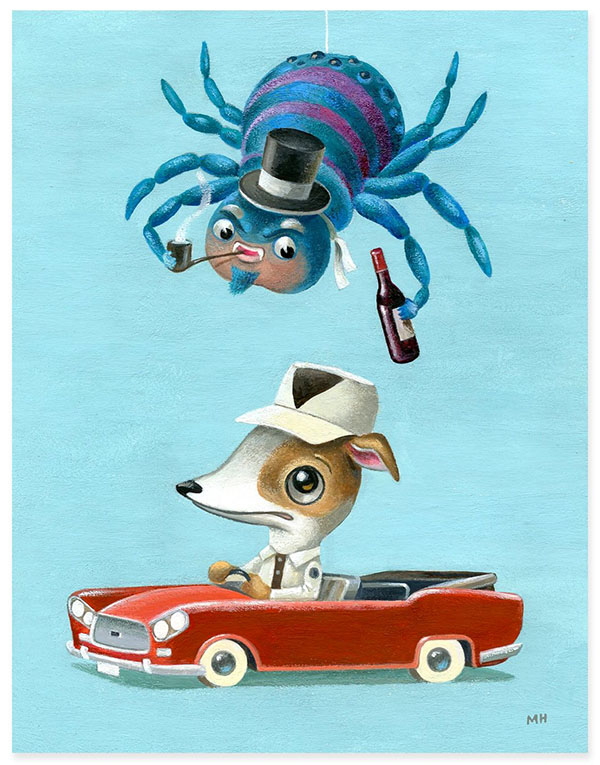
Last Sunday, the 28th, Martin's friend of about 40 years, Sean Bowley, called me to tell me the awful news that Martin had taken his own life. It's taken a few days for Sean to process the tip of the iceberg of his - and our - loss.
Sean Bowley:
"Martin was in many ways a very private and unassuming individual who gazed into the refractive mirrors of his dreams and desire for a world far more innocent, more creative and more accepting than the one we know. Not satisfied with only the fulfilment of his own dreams he yearned for a world that would nurture, encourage and support the dreams of all. This was the deep well he extracted potions from to form and infuse his painted works on a near nightly basis. He was a survivor, but it seems that the world of 2021 dealt him an unfair hand and he could not adjust and launch his damage control mechanism.
"After a few days of thinking about it I cannot help but think that if someone or something had got to him in time, he would have found a way to endure. He had found a quiet and unassuming way to live life and give something of great worth to a world full of ignorant fools - with the exception of those who were like-minded, who looked up and saw the light of his beacon illuminating a dark world of base mentalities. Those people sat quietly with him and appreciated his work for the inspiration, and escape, it brought them. Via serendipity, or injustice, his paintings will now become a rare commodity to be prized by the lucky few who possess an original or purchased a signed print."
My last conversation with Martin was only two weeks before he died. We were the same we'd always been together, able to talk to each other and accept each other without reserve. His personality was still warm and friendly, compassionate. If he hadn't told me about his depression and huge grief I would not have known from his tone. He told me he'd had an awful year, but didn't want to 'bore' me with it except to explain about his dog Swizzel dying. He wasn't drawing (which for someone who obsessively created every day was nothing short of shocking), but doing nothing. Sometimes "literally nothing, Robert, just sitting around, doing nothing". For a fairly isolated individual - Martin was an intensely private person who (by choice) had few friends - I was concerned that months of dissociation and depression could form an enclosing spiral. I suggested counselling, but he told me he'd tried that. And that he was dealing with things. We spoke about depression and perspective, just a little. I told him he could call me anytime, just to talk rubbish if necessary. He said I could do the same. I resolved to call him again soon ...
Sometimes "literally nothing, Robert, just sitting around, doing nothing". For a fairly isolated individual - Martin was an intensely private person who (by choice) had few friends - months of dissociation and depression would likely form an enclosing spiral. I suggested counselling, but he told me he'd tried that. And that he was dealing with things. We spoke about depression and perspective, just a little. I told him he could call me anytime, just to talk rubbish if necessary. He said I could do the same. I resolved to call him again soon ...
But “soon” never came, and grief is not always as clear cut as the movies make it. For example, it's not always about the person who's died, but about ourselves, for the lost part of our internal/external constructed world.
"Life isn't black and white. It's a million grey areas, don't you find?" - Ridley Scott
Back in October 2015, I was staying with Sean Bowley (see above; you may recall Sean's band, Eden) while on a project in Melbourne. Sean asked me if I could write an introduction to an artist friend's exhibition catalogue. I had serious doubts I would have the time - and knowing Melbourne's tendency to sprout artists with greater frequency than prophets and beggars in “Monty Python's Life of Brian”, I doubted I would have the inclination.
This attitude vanished as soon as Sean showed me one of Martin's works hanging in his bedroom. I think it's the one below.
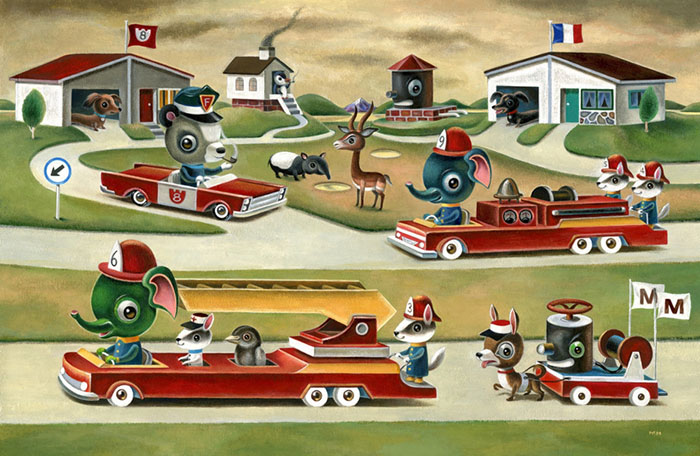
With my mouth somewhere on the floor, I demanded to see more of 'the artist's' work. I wrote a piece that day, emailed it to Martin, who liked it and invited me around.
I juggled things and found time to visit. I can't recall exactly but it was in the afternoon, his partner was at work and Martin had, apparently, got up early to meet me. We found an instant rapport, we were able to talk and have a conversation very easily ... but I thought that, like his art, his quiet and polite demeanour hid a great deal. I realised what Sean already knew, that for Martin to pursue his art required enormous determination, great "inner strength", which informed "the power of his work".
I won't belabour the point, but will direct you to the revealing comments he made in Josh Griffiths' interview in “Art Whore”. Josh has somehow managed to persuade Martin to describe his working methods, too, and it's nothing short of a lengthy, painstaking process.
JG: Of everything you have done what would you most like to be remembered for and why?
MH: That I was not intentionally hurtful to any person or living creature on this planet. That I created something that made the world in which we live just a little bit nicer to live in. When people who have bought my art tell me they love it, or that it makes them happy, I am overwhelmed with joy. I feel like that is my purpose – to bring some happiness and good vibes. Creating is my raison det’re.
I'll apologise to Martin now for reproducing his recent private message to Josh:
I would never act on my unwanted intrusive thoughts. I have made a pact with Swizzel, my dog who I adore.
I take this to mean that he would never give in and abandon his dog. What Martin's 'unwanted intrusive thoughts' were, exactly, we can only speculate.
Now, as even the most bovine of news services have picked up, the current isolation procedures during the stupidvirus pandemic have caused great mental and emotional harm.
Not just to children and fans of The Cure and Smashing Pumpkins, either.
To me, the two great revelations about 'the civilised west' over the last couple of years has been 1) how the hell did we get so very, very stupid and stubborn with it?, and 2) mental health is the biggest problem we have. Drugs, alcohol, temper tantrums involving samurai swords or SUVs at high speed and crowds, nurses and doctors either quitting or reducing their hours... they're all the same or similar reason. There is no normality if you can't get your damage healed. I don't give a handful of dried monkey's teats who runs the damn country, but they need to do their job. And that job involves helping us out when we're down so we don't check out.
Or, in the case of folks like Martin Harris (I mean, take a close look at the interview and images - then look at the appallingly tiny size of his work - then marvel at his extraordinarily precise methodology), help should have been available. For whatever reasons, it seems he found help difficult to access.
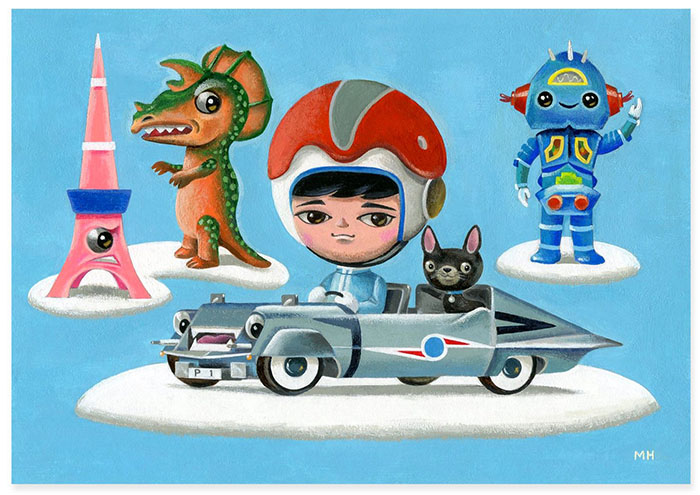
I never liked Robin Williams much as a comedian, though I thought he was a fine actor when he got the chance. Most of the time I found him so fucking annoying, like your brain when it won't stop chittering at you when you lie down to sleep and sleep won't come for hours upon hours. To this day I'm not sure if that chittering, desperate humour of Williams was a symptom of his depressive illness or a desperate attempt to drive it away. Hell, maybe it was both. See, however much someone has natural talent, that creativity can conceal, or distract the creative from any one of dozens of mood-crushing elements.
Martin's partner remarked recently;
"I recently had a conversation with Martin about going back to re-study to become a counsellor so that folk who need more psychological interventions are able to access these services than is currently our want.
"On a more serious note, I lost the only person that I truly loved and trusted, as too my wee adorable Swizzel. Four months prior to these two events, I lost my mother. So I feel truly alone in this world and it bleeding well hurts. Saying this though, I knew Martin far better than anyone and their so-called 'psychological insights'. Yes, he felt isolated from family and friends but together we coped by watching old Hammer Horror films and Ultra Q episodes which we both loved. I do not think people should connect the isolation with that of long-term depression issues – again, a contentious alignment that is more about these people than Martin."
Martin, if I could speak to you again, I'd try to encourage you to see how wonderful you are, and how much you took us out of our own isolated selves, just for an extraordinarily refreshing few moments as we looked on your work, emotions whirring.
Martin's partner should have the last word:
"Please let us all honour a man who gave graciously of his time, who always thought about others and who brought joy to those fortunate enough to be exposed to him personally and or via his beautiful art. Let us not paint a picture of a lost Soul who continuously struggled, as that was not the Martin that I certainly knew."

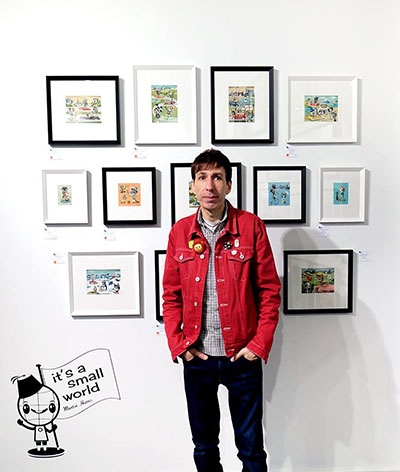 How best to remember Melbourne graphic Martin Harris who left the world a week ago?
How best to remember Melbourne graphic Martin Harris who left the world a week ago?